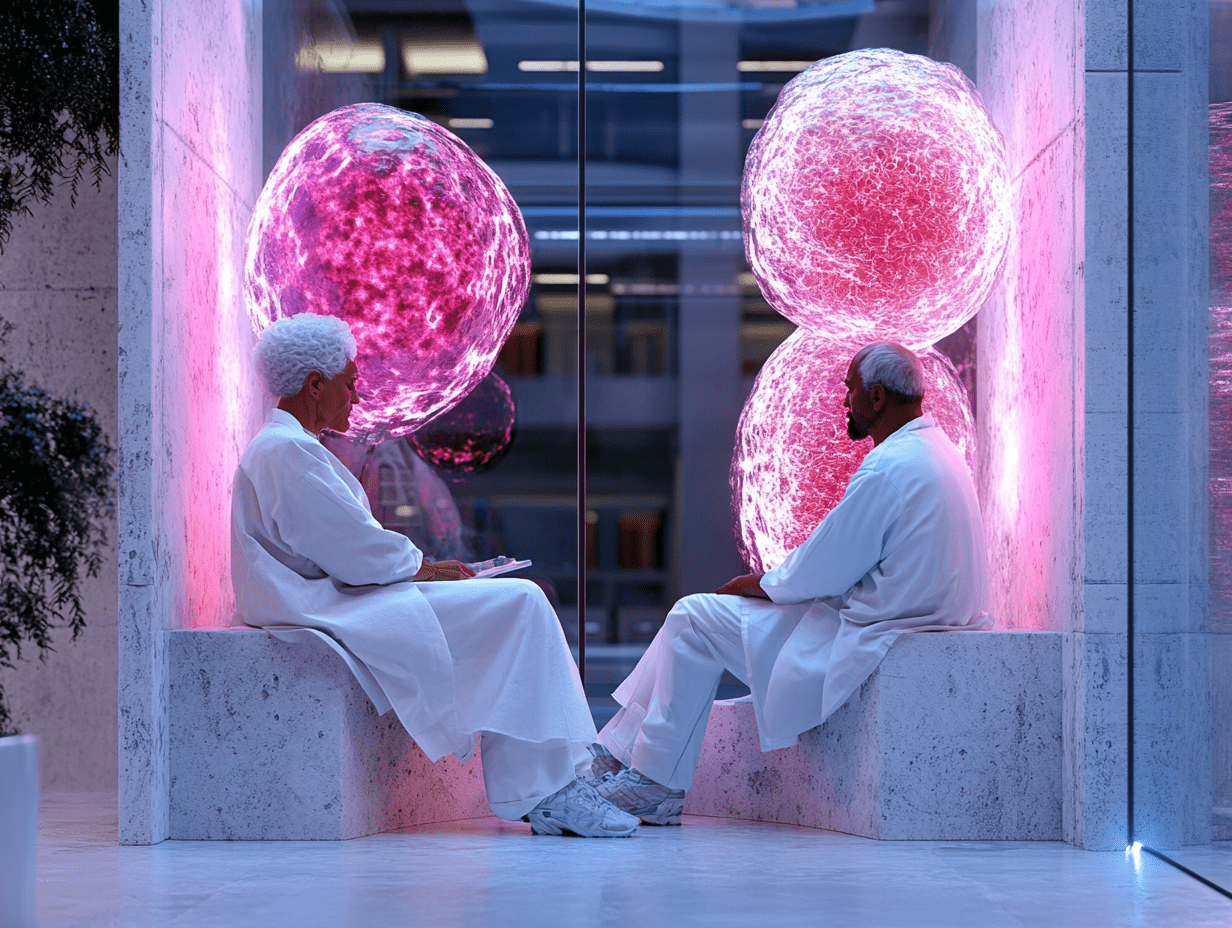These are the top questions to ask any Stem Cell Clinic, to help you work out if it’s right for you. Stem Cell Therapy has become an exciting option for treating various conditions, but you need to make you’re asking the right questions before booking any treatment. We’ve put together a list of the top questions you should be asking.
1. What Types of Stem Cells Do You Use?
Before proceeding with stem cell therapy, find out what types of stem cells the clinic uses. Remember, different countries are allowed to use different types of cells. If your in a country that doesn’t allow umbilical cord stem cells & the clinic’s offering them, you need to ask the question how and why. To see the differences between each country, our article on Best Countries for Stem Cell Therapy covers legalities in more detail.
Stem cells can come from different sources, including:
These are sourced from the hip bone and they’re collected by using a needle to draw liquid marrow from the hip bone itself. This is usually done under local or general anaesthesia
- Sourced from fat, these cells are usually collected through liposuction, from the lower stomach or thighs.
Umbilical cord–derived MSCs are stem cells taken from the umbilical cord after a baby is born, usually from the cord’s gelatin-like tissue called Wharton’s jelly.
2. If You’re Using Umbilical Cord Cells, How Are They Sourced?
If a clinic uses umbilical cord stem cells, ensure that they source these cells ethically:
- Ethical Sourcing: Ensure that donors give umbilical cords with informed consent and undergo thorough screening.
- Safety Standards: Ask if the clinic follows strict regulatory standards for collecting and processing these stem cells to prevent contamination and ensure safety.
Why is this important? Ethically sourced and properly screened stem cells protect your health and ensure the integrity of the treatment.
3. How much does everything cost, Including Consultation, Scans, Procedure and Post-Care?
Stem Cell Therapy involves several costs that can add up quickly:
- Detailed Breakdown: Ask for a comprehensive list of all associated costs, including the initial consultation, diagnostic scans, the procedure itself, and any post-care or follow-up visits.
- Hidden Fees: Inquire about any additional fees, such as laboratory charges, medications, or equipment costs.
- Accommodation: Translator etc: Does the price include things like accommodation, translators or is that extra?
- Additional Tax payment: In some countries like Japan, there will be an extra 10% added on for tax consumption. Make sure the price you have includes this. Always ask!
Why is this important? Understanding the total cost upfront helps avoid surprises and allows you to budget effectively. Last thing you want is to get there & find the price isn’t what you thought it was.
4. Do You Guarantee Results? If So, Stay Alert!
A reputable clinic should never guarantee results:
- Understanding Realistic Outcomes: Ask about the expected outcomes for your specific condition and how success is measured.
- Beware of Guarantees: Be cautious of any clinic that guarantees results, as this is a red flag.
Why is this important? Guarantees in medical treatments are often misleading. It’s important to have realistic expectations about what stem cell therapy can achieve. Especially as with most cases, it’s still experimental.
5. What Qualifications and Experience Do the Medical Staff Have?
Ensure that you are in capable hands:
- Medical Credentials: Ask about the training, certifications, and experience of the doctors and medical staff performing the procedure.
- Number of Procedures: Inquire how many stem cell procedures they have successfully performed.
Why is this important? Qualified and experienced medical staff reduce the risk of complications and improve the chances of a successful outcome.
6. What Are the Success Rates for My Specific Condition?
Different conditions respond differently to stem cell therapy:
- Success Metrics: Ask the clinic how they measure success and what their success rates are for treating conditions similar to yours.
- Evidence of Effectiveness: Request data or case studies that demonstrate their treatment outcomes.
Why is this important? Knowing the success rates helps set realistic expectations and determines if the therapy is likely to benefit you.
7. What Is the Clinic’s Accreditation and Licensing Status?
Verify the clinic’s legitimacy:
- Accreditation: Different countries will have different regulations. Some countries don’t really have any like Mexico or Panama. But in other countries like Japan & South Korea, clinics do have to go through approval processes.Make sure you know what to look out for here.
- Lab Quality: Do they have their own lab or they outsource the collection and culturing of cells? Does the lab hold any ISO or GMP certifications? You need to know if their own in house resources or outsourced providers are following best practise.
Why is this important? If a clinic can’t answer these questions correctly, stay well away. With our clinics at Alt Treatment, we do all of this beforehand. Reach out to us here to know more about the regulations in each country.
8. Are There Any Alternatives to Stem Cell Therapy for My Condition?
Explore all your options:
- Alternative Treatments: Ask if there are other treatments available that might be more suitable for your condition.
- Pros and Cons: Discuss the benefits and risks of each option with your provider.
Why is this important? Understanding all treatment options allows you to make a well-informed decision about your care.
9. What Is the Timeline for Seeing Results?
Set realistic expectations for recovery:
- Expected Timeline: Ask how long it typically takes to see results from the therapy.
- Follow-Up Care: Inquire about any follow-up care or assessments to monitor your progress.
Why is this important? Knowing the timeline helps manage expectations and prepare for the commitment required. Of course, this will vary from person to person but it’s good to know how other people have reacted to treatment. At Alt Treatment, we also do follow ups with you, to make sure everything is going OK and to see if you need any further support with anything.
10. What Should I Do to Prepare for the Procedure?
Preparation can impact the success of your therapy:
- Pre-Procedure Guidelines: Ask if there are any specific instructions you need to follow before the procedure, such as fasting or adjusting medications.
- Lifestyle Changes: Find out if you need to make any lifestyle changes leading up to the treatment.
Why is this important? Proper preparation ensures that the procedure goes smoothly and reduces the risk of complications.
11. What Are the Signs of Complications or Side Effects, and How Are They Handled?
Prepare for any potential issues:
- Recognizing Complications: Ask about the common signs of complications or side effects and how to recognize them.
- Emergency Procedures: Find out what steps the clinic takes if complications arise during or after the procedure.
Why is this important? Preparing for potential complications allows you to seek prompt care if needed.
12. How many Stem Cells will I actually be getting?
We’ve spoken to so many folks who are unaware of the amount of cells they’re getting or have got in the past.
- Make sure you know the dosage you’re getting.
13. Do you provide a Cell Quality Certificate?
Any reputable clinic should test their stem cells for viability, purity and contamination risks before injection. This should also show you:
- Passage number. How many times the cells have been expanded. Generally, best lad practise is to keep the number under 4 (most research studies follow this). However, most people get caught up with this and forget about the next point, which is probably more important.
- Stem Cell Markers/Quality: This is how we confirm the cells are really what they’re supposed to be. For MSCs, that usually means they’re positive for markers like CD73, CD90, and CD105.
- And negative for things they shouldn’t have, like CD34 or CD45. Just as important is making sure the cells are healthy, high viability, no contamination and normal chromosomes.
Why is this important? If a clinic cannot provide any certificates & won’t run through it with you, stay well away.
Conclusion
By asking these questions, you can make sure you’re choosing the right clinic & having the best chance of success. We understand that most people that come to us or are looking at stem cell therapy are in pretty difficult situations & just want something that can help.
But it’s super important to not rush into anything, understand there’s no guarantees with Stem Cell Therapy right now in most cases & try to find the clinic that is following best practices.
If you’re deciding which country is best for you, or want to talk about clinics we’ve already vetted, fill out our form below. Our team will guide you with clear, honest answers.
Alt Treatment is a free, independent platform that helps you understand stem cell therapy & decide if it’s right for you.
We break down complex information into clear, honest guidance. When you’re ready, we can connect you with verified clinics that meet your needs, in the right location, and often with exclusive discounts.
There’s no charge to use our platform. No hidden fees. No pressure. Our main aim is to genuinely help you figure out if treatment is right & the best places to consider.
If you want to talk, fill out our form here & our personal concierge team will reach out.
Stem Cell Therapy can treat a variety of conditions, from Osteoarthritis to Parkinson’s & hair loss.
However, there’s some areas where Stem cells are stronger then other.
If you want to know more, check out our Areas of Treatment Section or our Research section which has all the latest research on most conditions.
Price totally depends on what country you’re getting treatment from and what treatment you’re getting. To view average costs globally, we’ve put together a guide on Average costs around the world.
Fill in your details below
For a discounted offer for Stem Cell Therapy!






